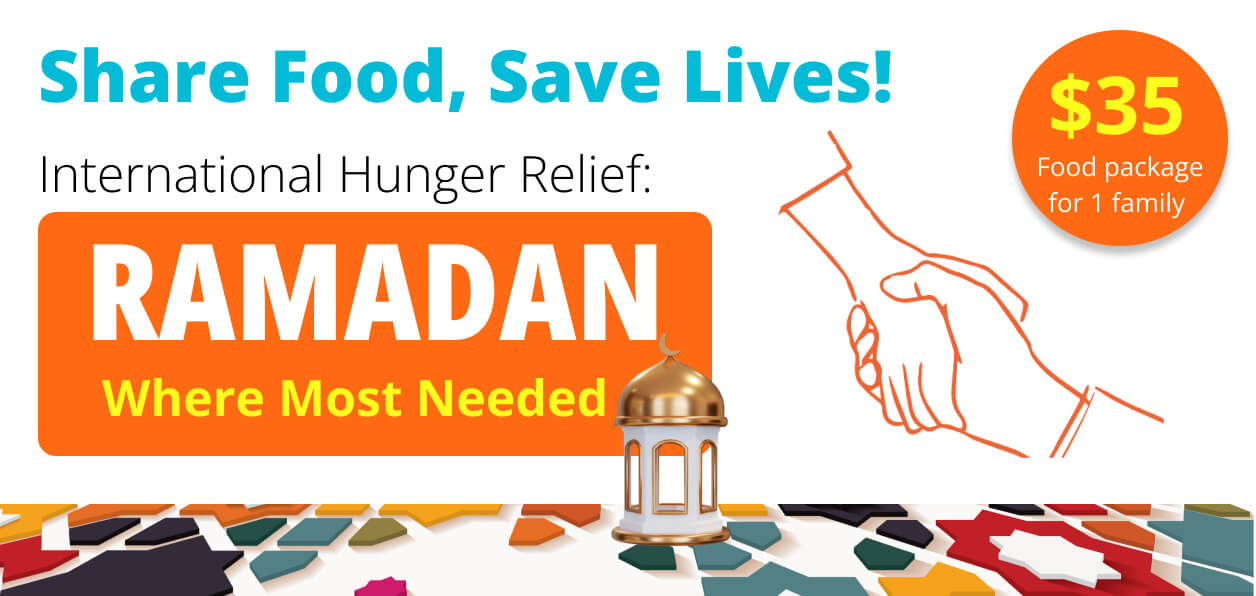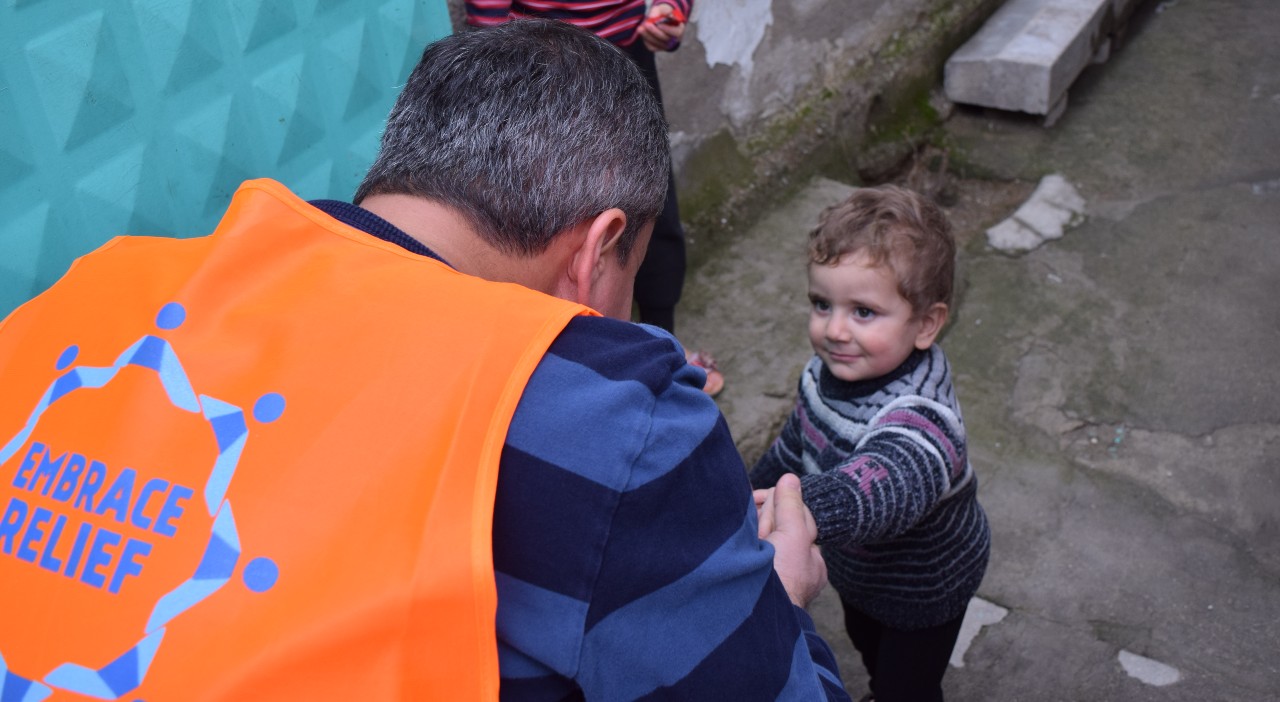Summary
- Do you know why Muslims around the world celebrate Eid al-Fitr?
- It’s one of the biggest days of the year for more than a billion people around the world, a day of breaking the Ramadan fast, feasting, and celebrating with friends and family.
- But the end of Ramadan is also the perfect time to consider the lives of the most vulnerable people among us.
- That’s why Embrace Relief’s International Hunger Relief: Ramadan campaign is working to provide food packages and hot meals to tens of thousands of people around the world.

Eid Mubarak! The end of Ramadan 2025 will be marked by Eid al-Fitr, which is expected to take place in the United States from sunset on Saturday, March 29, until sunset on Sunday, March 30.
Concluding the month-long observance of the holy month of Ramadan, Eid al-Fitr is one of the biggest holidays on the Islamic calendar. It’s a day known for its communal prayers, gatherings, feasts, gifts, and charity.
In English, Eid al-Fitr translates to “Feast of the Breaking of the Fast,” referencing the obligatory fasting period of Ramadan in which Muslims refrain from eating or drinking between the hours of sunrise and sunset. The exact date of Eid each year will vary, because it occurs not on a specific Gregorian calendar date, but rather at the first sighting of the crescent moon that begins Shawwal, the 10th month on the Islamic calendar.
Here are five things you need to know about this important annual festival:
Eid al-Fitr is a day of giving. At the conclusion of the Ramadan fast at sunset prior to the day of Eid, Muslims are obliged to give a charitable donation, zakat al-fitr, to support the needy. This is typically not a great amount of money – roughly $7 per person – but because all Muslims who can afford to are asked to donate, it adds up. Zakat is seen by many as a way to mirror God’s love and kindness, to offer thanks to God for guiding them through the difficult fasting period, and to strengthen community ties. (Embrace Relief accepts Zakat donations and will use them to support our humanitarian relief efforts. Learn more by clicking here.)
Eid is a day of communal prayer. Traditionally, morning prayers on Eid are held in an open space, often outdoors, allowing for communities to come together and offer their devotion to God. The Eid prayers consist of two rakat (sections), both preceded by a specific number of takbir (the repetition of the phrase Allahu akbar, “God is great”). These are followed by a sermon asking for forgiveness, peace, and blessings.
Eid is a day of banquets and feasts. The end of the Ramadan fast is cause for large meal gatherings on Eid, typically beginning once the morning prayer ends. With no more restrictions on what you can eat or drink – fasting is prohibited for the three days after the beginning of Eid – many households will prepare copious amounts of food depending on their local customs and cuisine. In many locations, there is an emphasis on sweet breakfast, lunch and dessert foods, giving the holiday the nickname “Sweet Eid.”
Eid is a day for family and friends to come together. Eid is celebrated as one of the most joyous days on the calendar. In many parts of the world, families will decorate their homes and open them to their families and neighbors. In addition to the food they share, friends and families will also give each other gifts, show off new clothes and shoes, and exchange blessings.
Eid al-Fitr is the “smaller” Eid holiday. Eid al-Fitr is only one of the two major Eid holidays in the Muslim world. The other, Eid al-Adha (Feast of the Sacrifice), is considered an even more important date in Islam than Eid al-Fitr. It commemorates the story of the prophet Ibrahim (known as Abraham in the Christian and Jewish traditions) and his willingness to sacrifice his son Isaac to earn God’s favor. This year in the United States, Eid al-Adha is expected to begin with sunset on June 6, 2025.
Eid al-Fitr is of course a joyous time marked by food, fun and family. But it’s also a time to come together and share blessings with your fellow man. It’s a time for charity, empathy, and a real sense of supporting your community.
The end of the Ramadan fast is the perfect time to consider the impact you can make on people who are forced to go hungry each day. At Embrace Relief, we’ve made it a core part of our mission to deliver food to people in more than 50 countries worldwide, thanks to the support of people like you. If you have the ability, there’s never a bad time to provide a charitable donation that will make a real impact in people’s lives. But this month of reflection, empathy and charity is an especially good time to do so!
Help feed people in need with Embrace Relief
All it takes is a donation to Embrace Relief’s International Hunger Relief: Ramadan 2025 campaign! Every dollar you donate will help us provide nutritious food packages to those who need it most – whether they live in Tanzania, Mali, Yemen, Indonesia, Greece, the United States, or any of the other countries where Embrace Relief works to provide much-needed aid.
During last year’s International Hunger Relief: Ramadan campaign, thanks to the generosity of donors like you, Embrace Relief was able to distribute food to more than 68,000 people in 21 countries spanning 5 continents. In 2025, we want to make an even greater impact – but we need your help to do it!
When you give to Embrace Relief this Ramadan, you will make a powerful difference in the life of a vulnerable family. Just $35 can provide a family of five with enough food for a full week, so don’t delay! Donate today using the form below and help Embrace Relief share nutritious food with our friends around the globe.






















